(This article contains massive spoilers for Bioshock Infinite and the Mass Effect Trilogy)
Since its release in late March, Bioshock Infinite has been the topic of many gamers’ conversations, editorials, podcasts and so on. What is it about the game that has been able to tap the intangible consciousness of gamers the world over? For me it was the confluence of story and gameplay, the way the game used the First Person Shooter genre as a Trojan Horse to infiltrate the mass market with its ambition of themes and concepts – a thinking man’s shooter that is at once visceral, cerebral, fun, and challenging.
I was immersed in the final moments of the game as its themes and concepts were explained to not only Booker DeWitt but also to me as the vessel through which Booker was guided. I was totally enamored with the ideas of the story, but not the telling of the story. While I could very easily articulate what I liked and didn’t like, it wasn’t until playing through the game again for all of the achievements that I realized how brilliantly flawed the game is. Bioshock Infinite is just that. A brilliantly flawed game that sometimes gets lost amongst its own ambitions in story and gameplay.
This is not a review of the game. Ted did a wonderful job of that here. I’m also not going to explain the ending as that has been done, at length, in other places. Instead, my intentions are to reconcile the aspects of the game I loved with the nagging portions I didn’t. To the game’s many champions, this may seem like picking nits, but so it goes when one makes something this worthy of dissection.
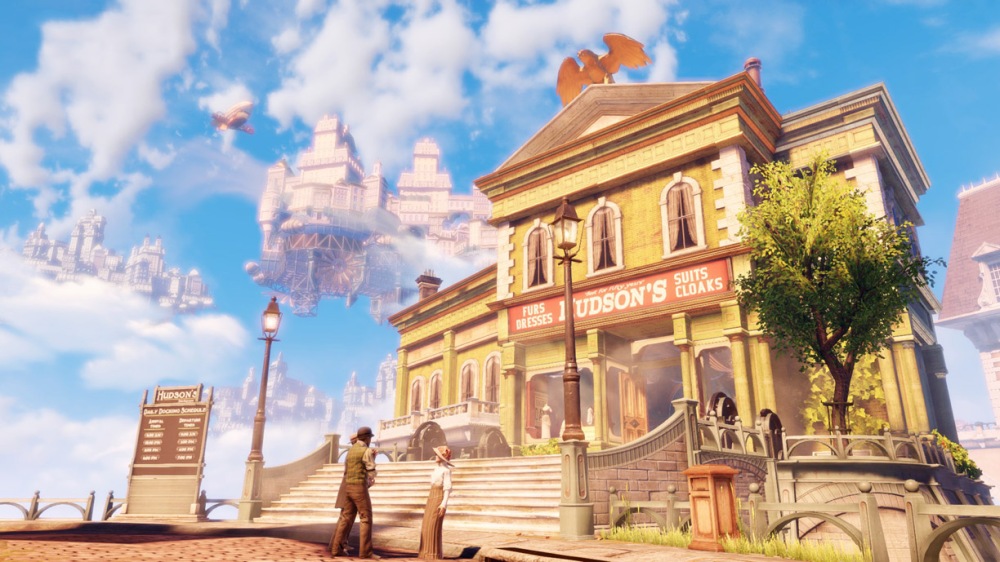
Tear ‘Em a New Shooter
Bioshock Infinite immediately impressed me with its approach to religion and its setting. Upon arrival to this Utopian society Booker and the player are inundated with swaths of religious imagery and set design. Pews, candles, statues and stained glass – all evoking a churchlike atmosphere. Only the statues aren’t of the typical Judeo-Christian iconography like Jesus and Mary. Because we’re new here, we don’t quite know who these people are, but something immediately feels “off.” After wading through waste high water in a seemingly flooded church – before you can even enter Columbia proper – the player is forced into baptism and “nearly” drowned.
Strolling through the streets of Columbia, it’s easy to be fooled into believing the world is alive. Families gather at carnival games, barbershop quartets sing to spectators, couples flirt with each other on the benches aligning the streets while vendors sell their wares – all serving the illusion that Columbia is a great place to live. Sure, it seems overly religious and that forced baptism was weird, but hey, it’s a floating city!
It’s not long before the veneer is shattered in a dark, disconcerting and ultimately violent way. And it’s here that one of Bioshock Infinite‘s many dark themes come rushing to the surface. The religion in this floating nation begets horrible racism and the “haves” have severely oppressed the “have-nots” and the citizens of this city are at violent odds over how they want life to be on Columbia.
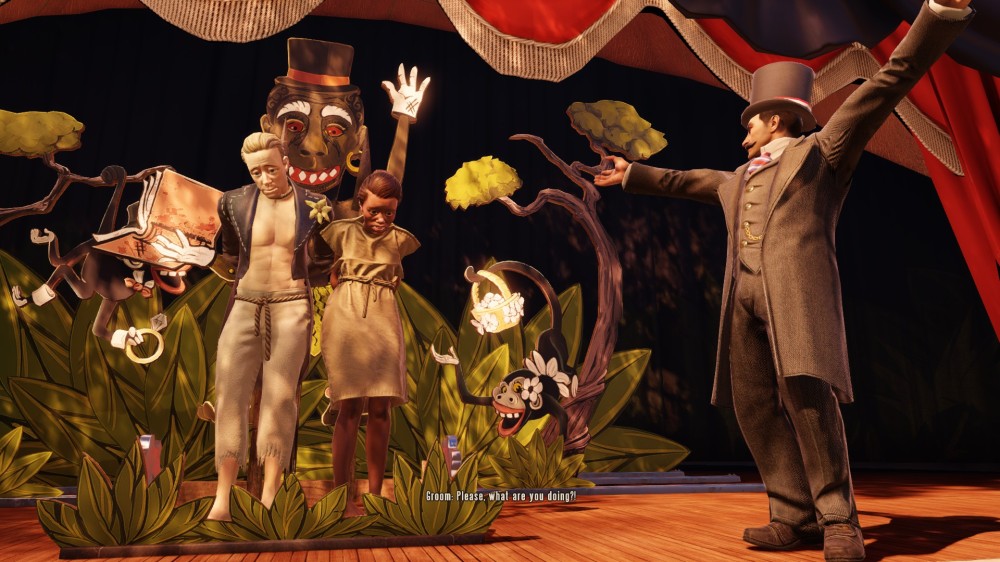
These concepts and themes are not new amongst literature, film, television, comics or even video games. Mass Effect deals with racism as one of its many cultural themes throughout its video game universe. The difference here is that there are no metaphors for racism. No disguising it behind a fictional alien species. These are human beings being shunned, chastised, humiliated and being generally treated worse than animals. It changes things for video games and for the player.
Never before has a mainstream, AAA video game dealt with these issues seriously and so directly. The fact that you can see these themes between aiming down the sights and exploding heads make it all the more interesting because this game is making people talk.
The Choices That Matter Don’t And That’s Okay
Bioshock Infinite‘s narrative is seemingly straight forward sci-fi involving inter-dimensional and time travel, but it offers a much more meta narrative about the illusion of choice in video games. In 2012, two games that revolved around choice were met with polarizing praise and criticism. First, Bioware’s epic Mass Effect trilogy came to a close and left an unfortunate wake of misunderstanding of the game’s overall achievements. Yes, the actual ending wound up being nothing more than 4 choices, seemingly undoing all the player had done prior, but if one follows the three act structure of storytelling, Mass Effect 3 was the entire last act and climax of the story being told over three games. As such, all of the player’s choices are present and accounted for within the entire campaign. I had Ashley kill Wrex in Mass Effect, and in Mass Effect 2 and Mass Effect 3, there was no Wrex. In Mass Effect 2 I managed to save all of my crew members. Lo and behold, they were all alive and well in Mass Effect 3. Stories and characters throughout my journey had callbacks, big and small, in the final chapter of the game.
The second game to really drive the mechanic of player choice home was Telltale’s The Walking Dead: The Game. A fantastic, dark, emotionally brutal story that kept track of every decision I made down to whom I shared food with. Ultimately though, the game funneled me into two choices that would have played out no matter what else I had done. Yet, it seems like nothing much was made about the execution of the idea of choice as far as negative criticism.
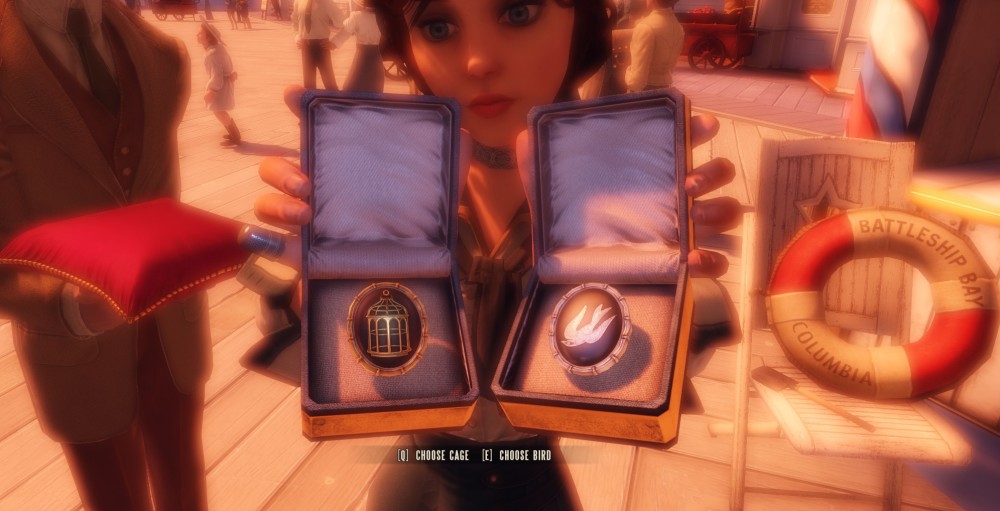
I mention these games because, again, Bioshock Infinite comments on the banality and illusory concept of player choice. Throughout the game, Booker is given choices. Some the player has agency in, like the cage or the bird necklace for Elizabeth and the choice to draw your gun or demand your ticket. Others, not so much, like calling “heads” or “tails” in a coin toss. All have absolutely no impact on the narrative overall because that’s the point. In the end, it’s always the same. The lighthouse, the man, the city. The setup is the same, the result is the same. The choices made during the game only really affect how the player enjoys the game in a purely visceral, chemical way. Choosing what Vigors to use, what weapons to upgrade; these are the choices that affect the gameplay, not the narrative and ultimately, that’s all there is with any video game. The fact that Mass Effect and The Walking Dead manage to even convey the illusion of choice in a meaningful way should be seen as nothing less than a resounding success.
Why Am I Here, Exactly?
Bioshock Infinite is about duality, divergence, left and right choices and how they can splinter off into infinite variables with infinite conclusions. The game does an extremely good job of being entertaining as well as thought-provoking, making it all the more disappointing when the game’s narrative fumbles some of the more important beats in the game.
For example, what are the Vigors? Why do they exist? Why does no one else use them despite the fact that a woman is literally giving them away and vending machines supply not only upgrades but the Salts that fuel them? In the original Bioshock, Plasmids were justified within the context of the narrative and played an integral part of the overall story. From their inception to creation, as well their use and abuse. Plasmids are the reason for the destruction of Rapture, for the existence of the little Sisters and ultimately the reason for Big Daddies. Even the ending the player received tied into Plasmids and what the player did for the power to use them. In Bioshock Infinite, Vigors merely exist and the cynical part me says they exist because they existed in the first game and that’s what player’s expect. Very little–if any–explanation or justification was given for them being included in the game beyond it being a combat mechanic designed into the game. The way Booker finds them throughout the game is even worse. He actually finds the Undertow Vigor on the ground, next to a dead soldier. Uh, OK.
When I first arrived at Columbia and walked the charming streets, I immediately started trying to interact with the citizens and I immediately discovered that I couldn’t. My mind started filling in blanks, wondering if this all played into the overall narrative, much like Plasmids did in the first game. Thinking that maybe there was a reason why I couldn’t affect their behaviors or why they rarely acknowledged me. Unfortunately, like the Vigors, it was not to be. The more I ventured into the world, the more I realized that the citizens were merely window dressing; that they were akin to the animatronic characters on display at Disneyland. Merely to be observed and not interacted with.
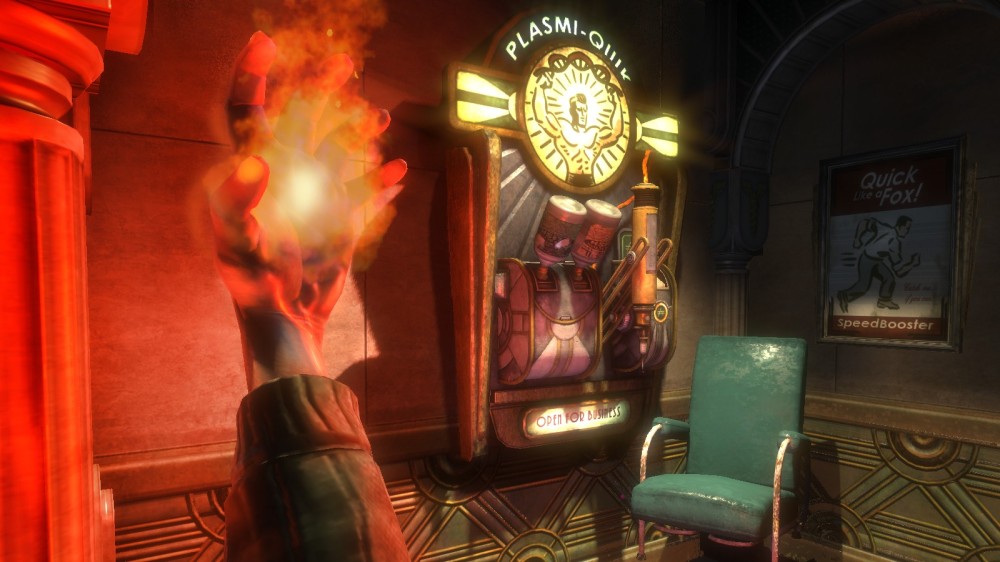
Booker’s task is to bring Elizabeth to New York, or so he thinks. Upon meeting Elizabeth, Booker “convinces” her that he is going to take her to Paris and they’ll be doing it by airship. Let’s ignore the fact that moments earlier we saw Elizabeth open a tear to not only Paris but also Paris in 1983 in which a movie marquee bears the title “La Revanche Du Jedi,” which is French for “The Revenge of the Jedi.” She frantically closes the tear as an oncoming vehicle careens towards her. This moment establishes quite a bit of information. First it establishes that Elizabeth can open tears to other times and an alternate dimensions, as evident with the movie marquee shown in the Parisian tear. It also shows that Elizabeth is interested to some extent in Paris. Lastly, it shows that these tears aren’t merely windows, but things can pass through from one dimension and time to the next. Which begs the question, if Elizabeth wants to go to Paris, why doesn’t she just step into the tear and be in Paris? Yes, I know that later they show Songbird coming through a tear indicating that her frightening protector/captor can follow her through the tears. That’s fine, but why then would she even bother following Booker to the airship, since Songbird can follow her anywhere and ultimately take her back to the tower? Also, if the Siphon in the Tower kept her power at a minimum, why was she able to completely open a tear that altered the reality of Columbia, not once but twice?
Ignoring these obvious plot holes, because the story dictates that we follow its intended progression, once we finally get on the airship Elizabeth knocks out Booker for his deception. When Booker comes to, we are introduced to Daisy Fitzroy, leader of the “Vox Populi,” an insurgent group bent on bringing down the upper echelon of Columbia, and ultimately Zachary Hale Comstock, the founder and leader of Columbia – both politically and spiritually. These details are seemingly important because the player will spend the next few hours on a giant fetch quest that, quite honestly, drags the mid-section of the game and could quite possibly be the biggest narrative copout I have ever seen. You see, the Vox need guns for their insurrection and for reasons that only Ken Levine knows, Booker and Elizabeth are the only ones who can get them. What follows is a very long series of events that end with Elizabeth opening tears and having Booker and herself step through them until they get to a reality in which the gunsmith they were trying to reach has supplied the Vox with the guns they need.
With only two scenes and some Voxophone recordings, Daisy Fitzroy goes from leader fighting for her people to vicious attempted child murderer without an ounce of progression. Yes, again, it’s understood that by going through the tears, this is a different Daisy Fitzroy which is meant to set up the twist at the end, but in doing so this portion of the story seems ultimately pointless. Not only does helping the Vox lead to them turning against you, but the whole reason why you’re helping them is to get the airship, which crashes moments after you reach it anyway. So those hours you spent fighting and back tracking were merely to serve the twist.
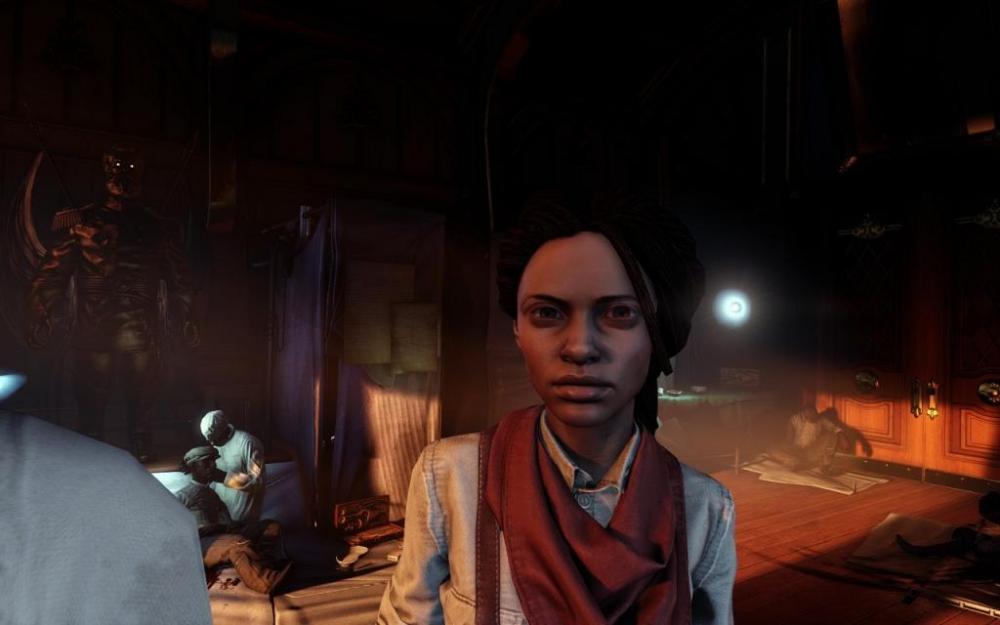
A Twist of Fate
M. Night Shyamalan’s The Village begins with a funeral. We see a fresh grave, a child’s coffin and on the tombstone we see the year of death as 1864. This serves one purpose -to show the audience that they are watching a period piece. The dialogue, the fashion, the entire way of life on display is meant to convey the period and the world these characters live in: 1864 Pennsylvania. Only it’s actually present day and the entire premise is hinged on the idea that because the founders were tired of modern day crime they unlearned modern English and colloquialisms in favor of speaking in 1864 old English – with accents – recreating period clothing, only reading books of the time, all to maintain the illusion that it was 1864 Pennsylvania. Why? For whose benefit was this ruse? Allow me to answer that question; for the audience, and for said audience to be fooled by the twist. There is no good reason other than to serve the twist that the characters in this movie look, talk and dress this way.
My reason for this mild digression is to point out that not only is this poor writing, but it’s also a very similar to the twist in Bioshock Infinite. As it so happens, Zachary Comstock and Booker DeWitt are one and the same. After the atrocities of Wounded Knee, Booker sought forgiveness for his sins, and was baptized. This baptism was viewed by Booker as absolution from his sins, and thus instead of changing his life for the better, he somehow saw to the creation of Columbia and in turn gave genesis to a utopia founded on racism and religious fanaticism. In another reality, Booker rejected the baptism, became a gambler and a drunk and sold his daughter, Anna, to repay a debt. If you’re this far into reading this, you know all about how Elizabeth and Anna are the same as well and that Comstock raised Elizabeth on Columbia.
Yes, we all know the plot and the twist. Here is my issue though: Why on Earth would Booker change his entire name? What is the significance of the name Zachary Comstock? We never find out, so what we are left with is that the man we have been chasing down to kill for the last third of the game turns out to be the same man as our avatar only in another dimension. Again, for whose benefit did Booker DeWitt become Zachary Comstock? The game never tells us because, like the Village, this only exists in service of the twist.
Now, this might seem like picking serious nits for those who love the story of the game, but I assure you they are not. These are legitimate issues with the story of Bioshock Infinite. And they are all the more glaring to me because I love so much of what the game does right. I adore this game for its ambition and heady writing. I love that this game has given me something to write over 2500 words about and that I can have deep, meaningful conversations about a video game. Sure, it suffers some glaring flaws, but the mere fact that Bioshock Infinite exists as it does is a triumph for storytelling in games, as well as a showpiece for what shooters can be.
Related Link(s):
Booker became Comstock for Booker’s benefit
LikeLike
I don’t think Comstock knew how everything was going to pan out with Elizabeth the moment he became Comstock, though.
LikeLike
That was your big issue with the “twist”? Booker hated everything that he was, and instead of just dealing with his problems like an adult, he chose to become “born again”. So he got baptized and changed his name.
LikeLike
I actually saw Comstock as a man broken because of what he’s done at Wounded Knee, not necessarily as someone who’s running away from his problems. If I were forced into killing so many people I wouldn’t even know how I’d turn out coming out of it. With that said, there’s a lot of context that’s withheld that it’s pretty difficult to find a definitive motivation.
Our thoughts on Comstock is that he’s ruthless, vile, and evil, but as Elizabeth iterates in the ending, there’s many different doors and with them, many possibilities. It actually makes me wonder if there was a Comstock in one of those worlds that wasn’t vile, ruthless, or evil and if Booker had pretty much killed those too by proxy.
LikeLike
He had no reason to change his name. I know actual born again Christians and not a single one of them changed their name. His name was changed here to serve the twist. If he hadn’t changed his name, there would be no twist.
LikeLike
Your reading too much into things. Like the coin flip you mention at the beginning of your article, it doesn’t matter what his name is. It all boils down to the lighthouse, the man and the city. You nit pick on something, but only after you answer your own question about it. How is a name different from a coin flip? Why do we all make the choices we do? Do we really have a choice if there are an infinite amount of outcomes? Look at the ending, there is no way to stop any of the outcomes unless you don’t exist to make them happen. I also take issue with this statement, “There is no good reason other than to serve the twist that the characters in this movie look, talk and dress this way.” It’s called a plot device. Name me a movie that does not use it’s setting, characters and their motivations to tell a story. you can’t because that is what makes a movie. You could take the above statement and say that about any movie ever made or book ever written that has a “twist.” Of course there is a reason for it. It tells a story and there is nothing else to say about it. Whether or not you like the movie is a matter of opinion, but to dismiss something just because it “serves the twist” is ridiculous. You did not like the ending, is the only valid statement you could make. Would you say that Rosebud in Citizen Kane only existed to serve the “twist” ending? The only part I agree with you on is the vigors.
LikeLike
I feel the same way, quite a few elements of the story feel a bit underdeveloped
LikeLike
also what is the explanation for comstock to be old and white-bearded while you (booker) are young and fit as a fiddle? also how did booker’s reality and a comstock reality converge from the get go? I feel like there was too much thought put into concepts and not enough effort put into fleshing everything out.
LikeLike
Comstock isn’t old, though. You get that impression the entire game because of his station., but listen to his voice. It doesn’t have any of the tremor of an old man. And when you finally meet him, he’s just not old. He’s just not.
LikeLike
One of the Voxophones hypothesizes as to the reason, which is a possible exposure to the tears. This is also the reason why Comstock is sterile and unable to bed Lady Comstock:
The Prophet Is Dying
December the 4th, 1907
“The Prophet is dying. The metastasis has aged him so quickly. Why does this Comstock decay, while a Comstock in another world remains fit? If genetics are destiny, what accounts for the difference? Perhaps exposure to the contraption? Hm. It merits further study.”
LikeLike
Daisy Fitzroy is not under developed in the least. What a really silly thing to write.
LikeLike
Thanks for reading!
What makes you think she’s developed well?
LikeLike
Ok I’ll try to explain my view, even though I think it’s obvious.
First off this is a ‘game’ and ‘game’ writing is a different discipline to book or film character writing. That fact is actually very important and in a game like the bioshock games even more so.
The fact is you have dismissed the character as underwritten which in context with the bioshock universe is either a silly statement or a very lazy statement. Daisy’s character is a plot device but an incredibly filled out and believable one, but she is also a game play device and that’s what the bioshock games do so well, in short that’s part of the game play and you would be familiar with the bioshock style if you had played the previous games. You as the player are given the responsibility of finding her story out through the obvious voxophones and the much more subtle environmental clues. If you were paying attention you end up with an incredibly well written and filled out character. You know why she came to Columbia, you know who she worked for and her feelings about her situation and the people around her. You know why she started/led a rebellion. You understood why she was so angry and bitter and why this bitterness turned to hate and destruction, both of Columbia and of herself and you’re told all of this more of less from the character herself.
So yes I stand by my statement, there is no way on earth that the Character Daisy Fitzroy was ” frustratingly underwritten”
She is a rare thing in fact, a is a beautifully written interesting human character which is getting rarer and rarer in any from of media. I would suggest your frustration was not being familiar with the bioshock style of story telling through game play and player participation. Bioshock doesn’t preach so much it is much more clever and ambiguous than that, and isn’t that refreshing and mature in the way it treats it’s audience? It merely shows you a world and leaves it up to you the player to make up their own mind about it in the main. Just don’t dare call that bad writting because it’s not. Compare Daisy to Marlene in the last of us and tell my truthfully who is the better written believable character?
LikeLike
Thank you for taking the time to explain your position. I always appreciated when someone backs up their opinions through well thought out dialogue. It’s valuable and again, appreciated. Though I do take slight exception to you saying my statement is lazy. Maybe a poor choice of words, or just lack of a better word, but I assure you my stance is well thought out and articulated.
That said, I completely disagree that games writing needs to be taken at a different value than movie or TV writing. In fact, several games in the past 2 years have shown quite the opposite. Portal 2, The Last of Us, The Walking Dead and even Tomb Raider – which has made Lara Croft a very well-written and developed character. All of these games feature incredibly fleshed out characters within the actual game story and not ancillary, missable subtext.
Voxophone’s do fill out her story, but that is side content that can be completely missed. In the context of the game Fitzroy is presented as a leader of the rebellion, she tasks you with something, Elizabeth (who is also an incredibly well developed, well-written character) opens a few tears, and then Fitzroy is driven mad by power. There is an arc, for sure, but it’s not well-written for fleshed out. Especially when you have characters like Elizabeth and Booker in the same game, and Andrew Ryan in the same universe.
Make no mistake, I am not saying her motivations aren’t understandable but that doesn’t equate to being well-written and fleshed out. Take, for example, the film Scream. We understand the motivations because the script tells them to us but that doesn’t, by any means, indicate that Billy and Stu were well-written. Going to video games, in Call of Duty: Ghosts the antagonist’s motivations are laid out and easy to understand in the context of what the story is saying, but that doesn’t mean that it’s well-written.
Daizy Fitzroy, to me, is nothing more than a plot device without the benefit of being an actual character. She exists to foreshadow the twist with Booker and how power can corrupt, and to send Booker and Elizabeth on a fetch quest. Yes, her arc is essentially 1 +1 + 2 and it makes logical sense, but in writing characters, it should be more fleshed out than simple math. Obviously this is my opinion and why I wrote what I wrote, but again, I appreciate that you took the time to reply to me.
LikeLike